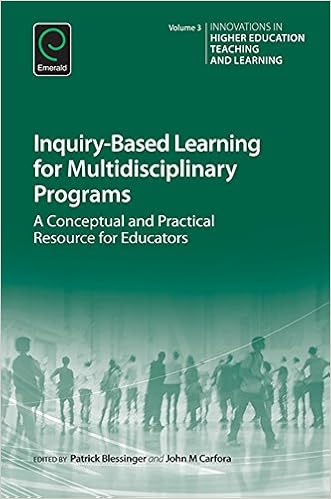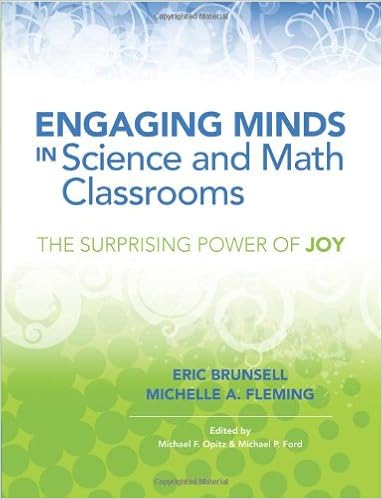
By Patrick Blessinger
Inquiry-based studying (IBL) is a learner-centered, lively studying setting the place studying is cultivated by way of a technique of inquiry owned by means of the learner. It has roots in a constructivist academic philosophy and is orientated round 3 elements: 1) exploration and discovery (e.g. problem-based studying, open meaning-making), 2) real investigations utilizing contextualized studying (e.g. box and case studies), and three) research-based method (e.g. research-based studying, project-based learning). IBL starts off with an actual and contextualized challenge state of affairs the place rookies determine their very own concerns and questions and the instructor serves as consultant within the studying method. It encourages self-regulated studying as the accountability is on novices to figure out concerns and learn questions and the assets they should tackle them. this manner studying happens throughout all studying domain names. This quantity covers the problems and ideas of ways IBL might be utilized to multidisciplinary courses. It serves as a conceptual and useful source and advisor for educators, delivering useful examples of IBL in motion and various ideas on tips on how to enforce it in several contexts.
Read or Download Inquiry-Based Learning for Multidisciplinary Programs: A Conceptual and Practical Resource for Educators PDF
Similar education & teaching books
Eric Brunsell's Engaging Minds in Science and Math Classrooms: The PDF
We elect, each day, even if we will flip scholars on or off to technological know-how and arithmetic in our school rooms. day-by-day judgements approximately the best way to contain creativity, selection, and autonomy quintessential parts of engagement can construct scholars self-efficacy, hold them stimulated, and increase their identities as scientists and mathematicians.
New PDF release: Poetic Inquiry II – Seeing, Caring, Understanding: Using
This quantity deals a singular selection of overseas works at the use of poetry in inquiry that transcends traditional disciplinary limitations. the purpose is to demonstrate an 'aesthetic stream' in social sciences and specifically in overall healthiness and in schooling. the gathering builds a bridge among the humanities and healthiness and schooling through supplying leading edge exemplars of use of poetry in social technology learn and within the context of the numerous diversified disciplinary contexts.
Additional resources for Inquiry-Based Learning for Multidisciplinary Programs: A Conceptual and Practical Resource for Educators
Sample text
H. (2000). Assessing learning in a technologysupported genetics environment: Evidential and consequential validity issues. Educational Assessment, 6, 155À196. , & Chinn, C. (2007). Scaffolding and achievement in problembased and inquiry-learning: A response to Kirschner, Sweller and Clark (2006). Educational Psychologist, 42(2), 99À107. , & Sammon, S. (2007). Inquiry in higher education: Reflections and directions on course design and teaching methods. Innovative Higher Education, 31(4), 201À214.
Greene, D. , & Slatta, R. W. (2004). What is inquiryguided learning? In V. S. ), Teaching and learning through inquiry: A guidebook for institutions and instructors (pp. 2À16). Sterling, VA: Stylus. Levy, B. L. , Thomas, E. , & Rex, L. A. (2013). Examining studies of inquirybased learning in three fields of education: Sparking generative conversation. Journal of Teacher Education, 20(10), 1À22. , & Ford, N. (2011). The pathway to inquiry based science teaching. The features of inquiry learning: Theory, research, and practice.
They critically reflect on various aspects of their project work, and they put the project into perspective in relation to broader social and academic issues. At this point, the supervisor acts as a discussion partner, helping not only to conclude the project, but also to bring out connections to more general theoretical or practical matters (see the section “The Exemplary Principle”). PPL Alternative in Self-Directed Higher Education 29 To help students focus on their project work in the second half of the semester, most courses are placed early in the semester, running parallel to and supplementing the early stages of project work.



